Simon Nicholls introduces the new Online Master's Degree in Comedy Writing interview
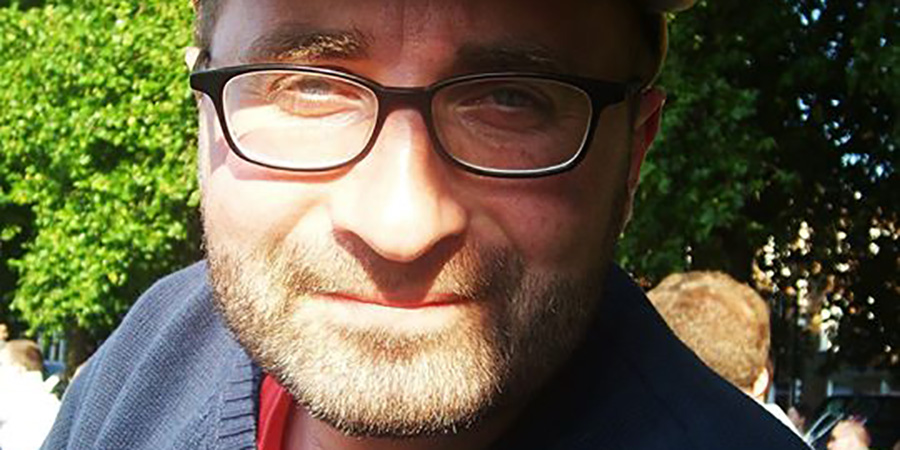
Top TV and radio comedy producer Simon Nicholls has devised a new Master's course in comedy writing for Falmouth University. It's an online degree, so you can be based anywhere whilst you study. Let's find out more from him...
Hi Simon. How did you first get involved in the world of comedy production?
After university I saw an advert seeking people to work on a Jonathan Ross comedy panel show. The ad said all you needed was a thorough knowledge of TV trivia. I sent them my anorak essay on TV trivia (I didn't go out much as a kid). Off the back of that, the producers phoned my house to fix up an interview. They spoke to my grandmother who lectured them at length about how I was a splendid young man who loved comedy. I understand my grandmother's bonkers words helped me stand out and get the gig.
After a few years working on TV panel shows - working with and learning from some brilliant producers who had started out as radio comedy producers - I applied for and was lucky enough to secure a gig as a trainee producer at BBC Radio Comedy.
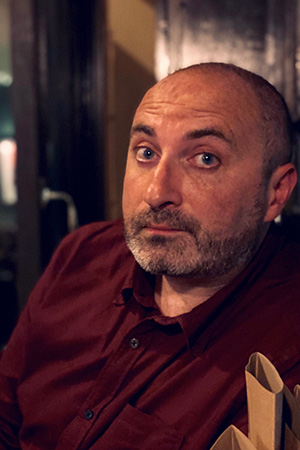
Tell us about some of the things you've made since then...
Early on I developed, sold and produced the first three series of Radio 4 comedy Ed Reardon's Week, which won a Broadcasting Press Guild and is still going strong. What I love about that show is that it's largely based on the writers' (Chris Douglas and Andrew Nickolds) real-life miserable experiences as professional writers.
I also produced Chris Addison and Carl Cooper's Sony Gold-winning comedy series The Ape That Got Lucky and Dave Gorman's comedy series Genius, which both transferred to TV, produced by me and exec'd by Armando Iannucci who I worked with for five years and learnt a lot from.
Recently I produced Bridget Christie's popular Radio 4 series, Bridget Christie's Utopia; a new Miles Jupp sitcom pilot, Party's Over (which we're writing a series of now); and I've just finished Sue Perkins' new natural history comedy series, Nature Table, which I co-created.
Like any producer who's been doing this job for 1000 years, I've been fortunate enough to work with a bonkers array of brilliant people. Jackie Mason, Olivia Colman, Johnny Vegas, Dawn French, Linda Smith and John Kearns to name just six. What a phenomenal episode of Blankety Blank that would make.
One of my favourite showbiz memories is spending an afternoon recording a radio comedy with the legend that is the actor Edward Fox. Like a numpty, I had mentioned that I was a huge fan of Day Of The Jackal when I asked him on. Edward turned up at BBC Broadcasting House in full 1970s Jackal safari suit and cravat. When we were recording The Fox completely lost it and got the giggles. Like really got the giggles. Uncontrollable giggles. The giggles where you start crying giggles. He kept telling himself off - "Grow up Edward! You're being a big baby. Be professional!"- before giggling some more. The Fox ended up going to the loo for 10 minutes to compose himself. I still have the tape of Edward's giggles and listen back to it at least once a year.
You've recently moved on from being an Executive Producer at BBC Studios. Why the change?
Simple: I wanted to live by the sea. My partner Catherine and I have wanted to live in Cornwall forever, the opportunity to create and lead the Falmouth Flexible Online Master's Degree in Comedy Writing came up and it felt like the right time in our lives to do something different. And our three-legged cat Colin looks phenomenal in Cornish tartan.
I really enjoyed being an exec at BBC Studios and miss my team of producers very much. What I love about being a producer or exec is nurturing and enabling writers, performers and producers to make their best work.
Leading the Online Master's Degree in Comedy Writing gives me the exact same joy; I can nurture, mentor and enable the students like I would as a producer. And I'm still very much in the game, coming to London producing shows for BBC Studios, but now freelance. I've just done a comedy series with Sue Perkins which was great fun. Later this year - pandemic permitting - I'm producing a sketch show pilot with Bafta-winning writer Brian Dooley and have a series of Miles Jupp's Party's Over to make.
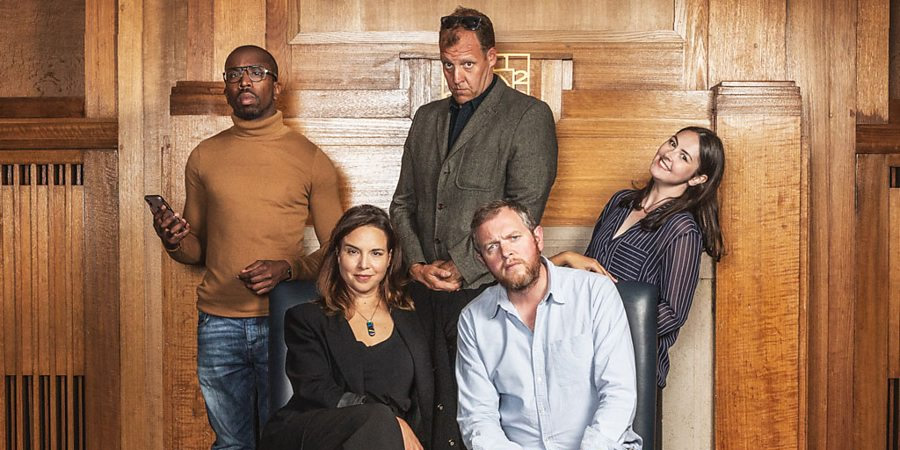
What has been the biggest challenge in your career so far?
I became a producer when I was 24 and made a bunch of shows that did well and won awards. I was a young arrogant twit who thought he knew everything. I then moved to TV and the first TV show I produced, a sitcom called Lab Rats, got mixed reviews. It knocked me sideways to be honest. It didn't go down as I'd hoped and it dented my confidence. When I look back on it now there's so much I love about that show, so much that I'm proud of. But at the time it felt like a failure. Also, when I look back on it, I learnt so much about producing from that, a positive for my work since. You learn a lot more from your mistakes than your successes.
When you work in the idiot world of comedy, it's all about how you learn from and come back after a miss, or a rejection. How you become better. And that's something I will instil in the students for the Falmouth Flexible Online Master's in Comedy Writing. You're allowed to have wobbles as a writer, we all have wobbles. It's all about believing in yourself, listening to others and keeping going.
I'm 42 now, like the Hitchhiker's Guide To The Galaxy (no relation), and these days when I produce a show that's done well, I appreciate it a lot more than my idiot young self did. Rather than a young arrogant twit producing comedy shows, today I'm a balding older twit producing comedy shows. And I'm happy with that.
Tell us more about the course...
It's a part-time 2 year Comedy Writing Master's. It's online, which I think is a big plus (and useful when there's a global pandemic).
Falmouth already has a very successful array of online courses and they're very popular and work really well.
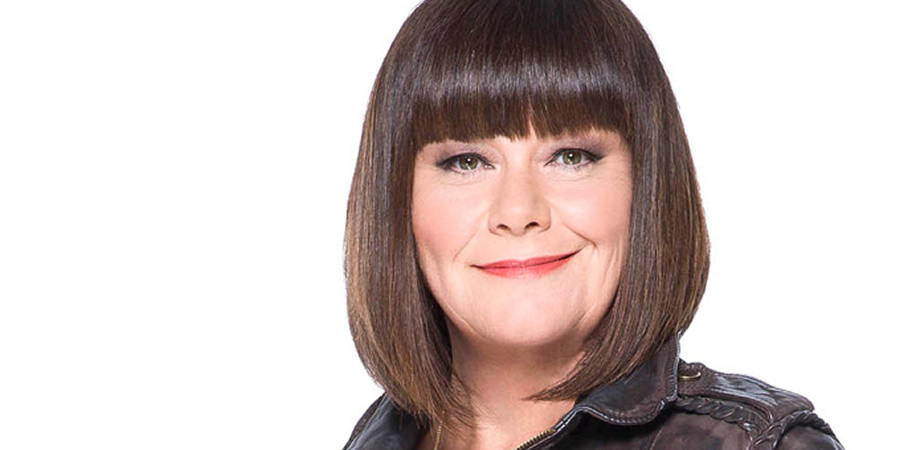
Dawn French is the chancellor of Falmouth University. She's very passionate about this course and keen to help as much as she can, which is brilliant. A lot of comedy courses that I've seen often involve you having to be based in / coming to London and last only a morning or a day. You can't learn comedy writing in a day! This MA remedies that.
In this course I'll teach everything I've learnt from being a comedy producer for 20 years, working closely with and learning from great writers and producers. We'll thoroughly go into creating and writing sketches, sitcom and comedy drama.
We'll focus on writing TV comedy, online comedy and audio comedy (including podcasting). We'll deep dive into the bastard that's plotting. We'll interrogate all the professional opportunities for writers and how to best exploit them. We'll explore how to best approach and get your work seen by producers and agents.
The Online Master's in Comedy Writing also focuses on team writing (a regular feature of US comedy and increasingly UK comedy), how to collaborate with performers and how to create your own show from scratch.
We'll teach writers the street-smarts of developing ideas that can sell. I've developed comedies for the US and UK and we'll explore that too. Literally everything that a comedy writer needs is taught clearly, thoroughly and in an informative entertaining way.
It will be hard work but it'll be fun and rewarding. The whole point of my wanting to do this is to create a course that builds up comedy writers who are then ready to enter the industry professionally: with a body of work that enables them to start a meaningful dialogue with producers and commissioners. I have a strong list of comedy industry contacts - writers, performers, agents, producers and commissioners - all of whom are excited to get involved.
Right now, there are lots of screenwriting courses out there but very few that are comedy specific. I would argue comedy writing is a lot harder than drama - you're trying to do everything that drama does and make people laugh. That's why I'm passionate that this course exists.
With the rise of the likes of Netflix, Amazon and Hulu, and with UK writers now writing US comedies (eg. HBO comedy drama Succession and sitcoms like Veep and Avenue 5) the world needs more comedy writers. There's a clear market for this.
Can you tell us more about the specifics of how things are organised, given it's online?

Across the 2 years, the Online Master's in Comedy Writing has 5 modules. 4 of the 5 modules encompasses 12 weekly sessions (the 5th gives you the space to take everything you've learnt and write a script of your choice).
During the 4 taught modules, each weekly session sees the writer visit the Course hub (posh for website) where there's a lecture written by me, full of illustrative clips and interviews with leading comedy industry people discussing the specific topic.
The students are given writing tasks each week to build up and hone their specific writing skills. Each week there's also a webinar (posh for 'video chat') , where I can interact with the students live, discussing the week's topic and answering any questions they have. There are also weekly forum discussions, where the students can talk with each other about the week's topic.
As I say, the team who are helping me build this have built a number of successful online master's courses, and I love the fact that even though it's online, students are constantly interacting with one another, they can speak directly with me each week and there's a real community team spirit to it - like you might have on a campus-based course. It's important to me that even though it's online, the students will have plenty of one-to-one time to speak with me.
The other cool thing is that it's designed to be part-time. There's a lot to do on the course, but it's written so you can juggle it with your everyday life - with having a job. You can tackle each week, each module, in your own time. And my webinars are recorded, so if you can't make it you can watch it back when it suits you. The fact that students can be based anywhere in the world and juggle the course with their everyday schedules, working at their own pace, is a clear wonderful positive.
What sort of people are you looking for?
The obvious thing, whoever you are, is showing me your obsessive passion for comedy and your specific burning passion to write comedy.
Anybody who desperately wants to write comedy should apply. This could be someone who's never written comedy but wants to try. It could be actors and performers who are passionate about comedy and want to create their own material. Or it could be people who already work in comedy, or theatre or television or audio and have an itch to write comedy.
In terms of skills to succeed on the Online Master's in Comedy Writing, a natural sense of humour can't hurt, alongside a strong passion to write comedy, focus, dedication, a thick skin and a high work ethic will see you through.
Some people say it's almost impossible to get something you've written broadcast if you're new... there's so much competition. We guess, given you've created this course with the aim of setting people up with a career, you'd disagree?
Like any industry there's competition and you have to work hard, but absolutely it's possible to get your new work broadcast.
Look at Newsjack on Radio 4 Extra - that's written by new writers. A lot of those writers then build up a rapport with a producer and develop shows with them that then sell.
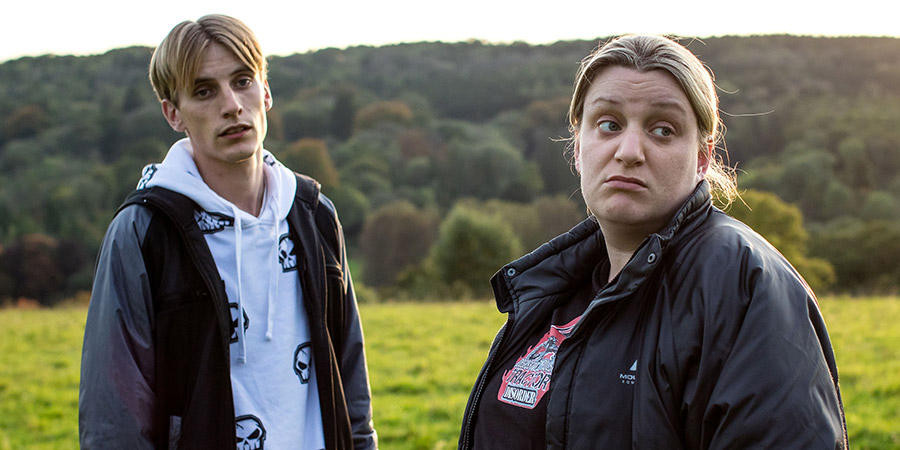
Look at Daisy May and Charlie Cooper - they filmed a clip of themselves at home, sent it out and now they've won a Bafta.
It's about having the skills and crucially about being pro-active. It's about hustling (in a polite way) and getting your work seen. It's about building up a rapport with a producer, who gets your writing and will champion your work.
I secured Sean Gray - now a Bafta and Emmy winning writer - a series for the first narrative he wrote - called iGod. He was clearly a great writing talent and I championed him. Yes, it's perhaps easier to show off your work if you're a writer performer, but if you're a writer then be pro-active and find people you can film a sketch with and approach producers.
On the Online Master's in Comedy Writing, we'll thoroughly go into this - how to be pro-active, take the initiative and open doors for yourself.
If you could change one thing about the world of British comedy, what would it be?
I definitely think that right now the world of British comedy needs an Online Master's in Comedy Writing led by an enthusiastic and experienced balding producer who is keen to help teach students how to write great comedy - in all its different commercial forms - giving them the street-smarts to become professional comedy writers. I think this - above all else - would be a positive step for the world of British comedy. Ahem.
Find out more about the Falmouth Flexible Online Masters Degree in Comedy Writing.
This article is provided for free as part of BCG Pro.
Subscribe now for exclusive features, insight, learning materials, opportunities and other tools for the British comedy industry.

